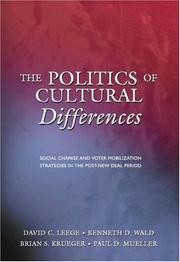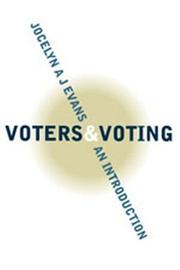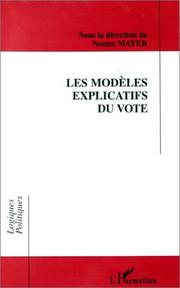| Listing 1 - 10 of 106 | << page >> |
Sort by
|

ISBN: 0691091536 0691091528 1400825407 9786612157349 1282157345 9781400825400 9780691091525 9780691091532 9781282157347 Year: 2002 Publisher: Princeton, N.J. : Princeton University Press,
Abstract | Keywords | Export | Availability | Bookmark
 Loading...
Loading...Choose an application
- Reference Manager
- EndNote
- RefWorks (Direct export to RefWorks)
How did Republicans manage to hold the White House through much of the past half century even as the Democratic Party held the hearts of most American voters? The authors of this groundbreaking study argue that they did so by doing what Democrats have also excelled at: triggering psychological mechanisms that deepen cultural divisions in the other party's coalition, thereby leading many of its voters either to choose the opposing ticket or to stay home. The Politics of Cultural Differences is the first book to develop and carefully test a general theory of cultural politics in the United States, one that offers a compelling new perspective on America's changing political order and political conflict in the post-New Deal period (1960-1996). David Leege, Kenneth Wald, Brian Krueger, and Paul Mueller move beyond existing scholarship by formulating a theory of campaign strategies that emphasizes cultural conflict regarding patriotism, race, gender, and religion. Drawing on National Election Studies data, they find that Republican politicians deployed powerful symbols (e.g., "tax and spend liberals") to channel targeted voters toward the minority party. And as partisanship approached parity in the 1990's, Democratic leaders proved as adept at deploying their own symbols, such as "a woman's right to choose," to disassemble the Republican coalition. A blend of sophisticated theory and advanced empirical tools, this book lays bare the cultural dimensions of American political life.
Voting --- Voting research --- Politics and culture --- Social choice --- Voting behavior research --- Research --- Elections --- United States

ISBN: 1446216799 9786610369188 1280369183 1412931967 9781412931960 9780761949107 0761949100 9780761949091 0761949097 9781446216798 6610369186 0761949100 0761949097 9781280369186 Year: 2004 Publisher: London ; Thousand Oaks, Calif. : SAGE,
Abstract | Keywords | Export | Availability | Bookmark
 Loading...
Loading...Choose an application
- Reference Manager
- EndNote
- RefWorks (Direct export to RefWorks)
An accessible textbook that provides an overview of the historical origins and development of voting theory, this guide explores theories of voting and electoral behaviour at a level suitable for college students.
Voting research. --- Voting research --- Voting --- Voting behavior research --- Elections --- Methodology. --- Research
Book
ISBN: 9781009357005 9781009357036 Year: 2023 Publisher: Cambridge Cambridge University Press
Abstract | Keywords | Export | Availability | Bookmark
 Loading...
Loading...Choose an application
- Reference Manager
- EndNote
- RefWorks (Direct export to RefWorks)
This phenomenon of retrospective voting requires that individuals integrate and appraise streams of performance information over time. Yet past experimental studies short-circuit this 'integration-appraisal' process. This title develops a new framework for studying retrospective voting and present eleven experiments building on that framework.
Voting research. --- Voting research --- Methodology. --- Voting --- Voting behavior research --- Elections --- Research

ISBN: 9780761949107 9780761949091 0761949097 0761949100 Year: 2004 Publisher: London: Sage,
Abstract | Keywords | Export | Availability | Bookmark
 Loading...
Loading...Choose an application
- Reference Manager
- EndNote
- RefWorks (Direct export to RefWorks)
'This clear and comprehensive textbook will be invaluable for undergraduate and graduate courses on elections and voting behaviour. Complex theoretical and statistical ideas are explained lucidly and effectively - no mean achievement' - Representation 'Voters and Voting fills a yawning gap in the study of elections and voting behaviour. No other book today matches the breadth and depth of coverage provided by Jocelyn Evans. This book is destined to become a staple in university courses on elections, parties and political methodology. It will
Voting research --- Methodology --- #SBIB:324H42 --- Politieke structuren: verkiezingen --- Voting --- Voting behavior research --- Elections --- Research --- Political sociology --- Voting research - Methodology
Book
ISBN: 0191834297 9780191834295 0192509977 Year: 2017 Publisher: Oxford : Oxford University Press,
Abstract | Keywords | Export | Availability | Bookmark
 Loading...
Loading...Choose an application
- Reference Manager
- EndNote
- RefWorks (Direct export to RefWorks)
'Voters and Voting in Context' investigates the role of context in affecting political opinion formation and voting behaviour. Building on a model of contextual effects on individual-level voter behaviour, the chapters of this volume explore contextual effects in Germany in the early twenty-first century. The volume draws upon manifold combinations of individual and contextual information gathered in the German Longitudinal Election Study (GLES) framework and employ advanced methods.
Voting --- Voting research --- Social aspects. --- Social aspects --- Voting behavior research --- Elections --- Polls --- Politics, Practical --- Social choice --- Suffrage --- Research --- Balloting
Book
ISBN: 0190089490 9780190089481 0190089482 9780190089498 9780190089474 0190089474 Year: 2020 Publisher: New York, NY : Oxford University Press,
Abstract | Keywords | Export | Availability | Bookmark
 Loading...
Loading...Choose an application
- Reference Manager
- EndNote
- RefWorks (Direct export to RefWorks)
This book refutes the widely held convention that high turnout in national elections advantages Democratic candidates while low turnout helps Republicans. It examines over fifty years of presidential, gubernatorial, Senate, and House election data to show there is no consistent partisan effect associated with turnout. The overall relationship between the partisan vote and turnout for these offices is uncorrelated. Most significant, there is no observable party bias to turnout when each office or seat is examined through time. In some states, across the decades, gubernatorial and senatorial contests show a pro-Democratic bias to turnout; in others an increase in turnout helps Republicans. The pattern repeats for House elections during the 1970s, 1980s, 1990s, 2000s, and through the 2010s. The analysis demonstrates that, within the range that turnout varies in American elections, it is the participation and abstention of easily influenced, less engaged citizens - peripheral voters - that move the outcome between the parties. These voters are the most influenced when the short-term forces of the election - differential candidate appeal, issues, scandals, and so forth - help the parties. Since these influences advantage Republicans as often as Democrats, the oscillation in turnout that coincides with pro-GOP and pro-Democratic forces leaves turnout rates inconsequential overall. The connections between short-term forces and the election cycle dominate the inconsistent partisan effects of turnout.
Voter turnout --- Political participation --- Voting research --- Voting --- Voting behavior research --- Elections --- Election turnout --- Turnout (Voting) --- Voting turnout --- Research
Book
ISBN: 0190947608 0190947586 0190947594 Year: 2019 Publisher: New York, NY : Oxford University Press,
Abstract | Keywords | Export | Availability | Bookmark
 Loading...
Loading...Choose an application
- Reference Manager
- EndNote
- RefWorks (Direct export to RefWorks)
Negative campaigning is a central component of political campaigns in the United States. Yet, until now, most evidence has suggested that negative campaigning has little effect on voters. How can we reconcile the findings of a plethora of empirical studies with the methods of political elites? This book cuts through to the central issue: how such advertising influences voters' attitudes and their actions during campaigns. Focusing on U.S. senatorial campaigns, Kim Fridkin and Patrick Kenney draw from surveys, experiments, facial expression emotion tests, content analyses and focus groups.
Political campaigns --- Advertising, Political --- Voting research --- United States. --- Elections. --- Voting --- Voting behavior research --- Elections --- Research --- Mei-kuo tsʻan i yüan
Book
ISBN: 9780470291160 Year: 2008 Publisher: Hoboken (N.J.) Wiley
Abstract | Keywords | Export | Availability | Bookmark
 Loading...
Loading...Choose an application
- Reference Manager
- EndNote
- RefWorks (Direct export to RefWorks)
Election forecasting --- Exit polling (Elections) --- Voting research --- Elections --- Forecasting, Election --- Straw votes --- Forecasting --- Public opinion polls --- Voting --- Voting behavior research --- Polling, Exit (Elections) --- Data processing --- Research
Book
Year: 2012 Publisher: Washington, D.C., The World Bank,
Abstract | Keywords | Export | Availability | Bookmark
 Loading...
Loading...Choose an application
- Reference Manager
- EndNote
- RefWorks (Direct export to RefWorks)
This paper estimates the effect of enrollment in a large scale anti-poverty program in Colombia, Familias en Accion, on intent to vote, turnout and electoral choice. For identification the analysis uses discontinuities in program eligibility and variation in program enrollment across voting booths. It finds that Familias en Accion had a positive effect on political participation in the 2010 presidential elections by increasing the probability that program beneficiaries registered to vote and cast a ballot, particularly among women. Regarding voter's choice, the authors find that program participants expressed a stronger preference for the official party that implemented and expanded the program. Overall, the findings show that voters respond to targeted transfers and that these transfers can foster support for incumbents, thus making the case for designing political and legislative mechanisms, as the laws recently passed by the Colombian government, that avoid successful anti-poverty schemes from being captured by political patronage.
Conditional Cash Transfers --- E-Government --- Macroeconomics and Economic Growth --- Parliamentary Government --- Political Systems and Analysis --- Politics and Government --- Population Policies --- Poverty Reduction --- Voting behavior --- Colombia

ISBN: 2738452442 9782738452443 Year: 1997 Volume: *1 Publisher: Paris: L'Harmattan,
Abstract | Keywords | Export | Availability | Bookmark
 Loading...
Loading...Choose an application
- Reference Manager
- EndNote
- RefWorks (Direct export to RefWorks)
Voting research --- Elections --- Voting --- Sociologie électorale --- Vote --- Research --- Recherche --- France --- Politics and government --- Politique et gouvernement --- Sociologie électorale --- Polls --- Politics, Practical --- Social choice --- Suffrage --- Voting behavior research --- Vote - Recherche - France. --- Voting - France. --- Voting research - France.
| Listing 1 - 10 of 106 | << page >> |
Sort by
|

 Search
Search Feedback
Feedback About UniCat
About UniCat  Help
Help News
News